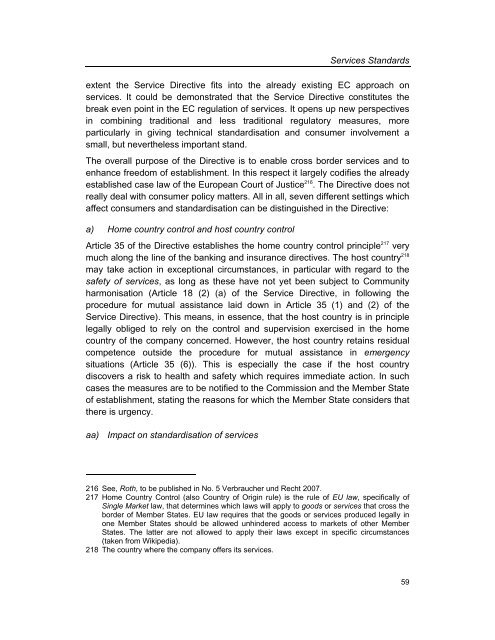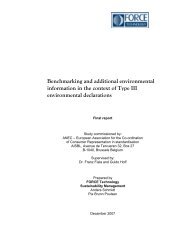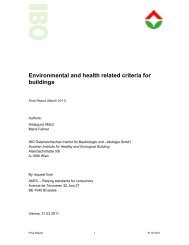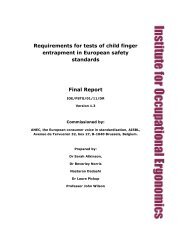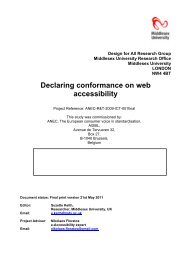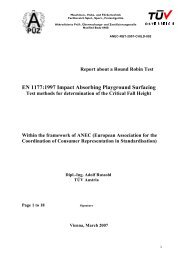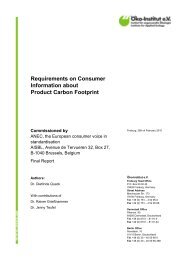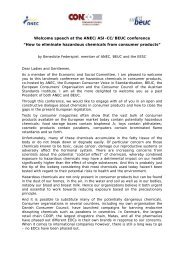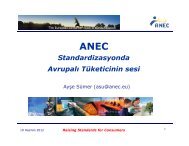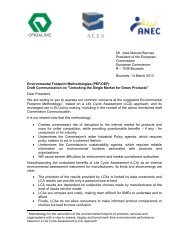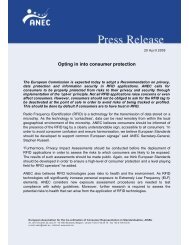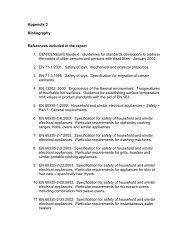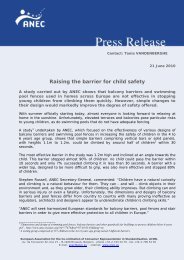Services Standards: Defining the Core Consumer Elements ... - ANEC
Services Standards: Defining the Core Consumer Elements ... - ANEC
Services Standards: Defining the Core Consumer Elements ... - ANEC
Create successful ePaper yourself
Turn your PDF publications into a flip-book with our unique Google optimized e-Paper software.
<strong>Services</strong> <strong>Standards</strong><br />
extent <strong>the</strong> Service Directive fits into <strong>the</strong> already existing EC approach on<br />
services. It could be demonstrated that <strong>the</strong> Service Directive constitutes <strong>the</strong><br />
break even point in <strong>the</strong> EC regulation of services. It opens up new perspectives<br />
in combining traditional and less traditional regulatory measures, more<br />
particularly in giving technical standardisation and consumer involvement a<br />
small, but never<strong>the</strong>less important stand.<br />
The overall purpose of <strong>the</strong> Directive is to enable cross border services and to<br />
enhance freedom of establishment. In this respect it largely codifies <strong>the</strong> already<br />
established case law of <strong>the</strong> European Court of Justice 216 . The Directive does not<br />
really deal with consumer policy matters. All in all, seven different settings which<br />
affect consumers and standardisation can be distinguished in <strong>the</strong> Directive:<br />
a) Home country control and host country control<br />
Article 35 of <strong>the</strong> Directive establishes <strong>the</strong> home country control principle 217 very<br />
much along <strong>the</strong> line of <strong>the</strong> banking and insurance directives. The host country 218<br />
may take action in exceptional circumstances, in particular with regard to <strong>the</strong><br />
safety of services, as long as <strong>the</strong>se have not yet been subject to Community<br />
harmonisation (Article 18 (2) (a) of <strong>the</strong> Service Directive, in following <strong>the</strong><br />
procedure for mutual assistance laid down in Article 35 (1) and (2) of <strong>the</strong><br />
Service Directive). This means, in essence, that <strong>the</strong> host country is in principle<br />
legally obliged to rely on <strong>the</strong> control and supervision exercised in <strong>the</strong> home<br />
country of <strong>the</strong> company concerned. However, <strong>the</strong> host country retains residual<br />
competence outside <strong>the</strong> procedure for mutual assistance in emergency<br />
situations (Article 35 (6)). This is especially <strong>the</strong> case if <strong>the</strong> host country<br />
discovers a risk to health and safety which requires immediate action. In such<br />
cases <strong>the</strong> measures are to be notified to <strong>the</strong> Commission and <strong>the</strong> Member State<br />
of establishment, stating <strong>the</strong> reasons for which <strong>the</strong> Member State considers that<br />
<strong>the</strong>re is urgency.<br />
aa) Impact on standardisation of services<br />
216 See, Roth, to be published in No. 5 Verbraucher und Recht 2007.<br />
217 Home Country Control (also Country of Origin rule) is <strong>the</strong> rule of EU law, specifically of<br />
Single Market law, that determines which laws will apply to goods or services that cross <strong>the</strong><br />
border of Member States. EU law requires that <strong>the</strong> goods or services produced legally in<br />
one Member States should be allowed unhindered access to markets of o<strong>the</strong>r Member<br />
States. The latter are not allowed to apply <strong>the</strong>ir laws except in specific circumstances<br />
(taken from Wikipedia).<br />
218 The country where <strong>the</strong> company offers its services.<br />
59


